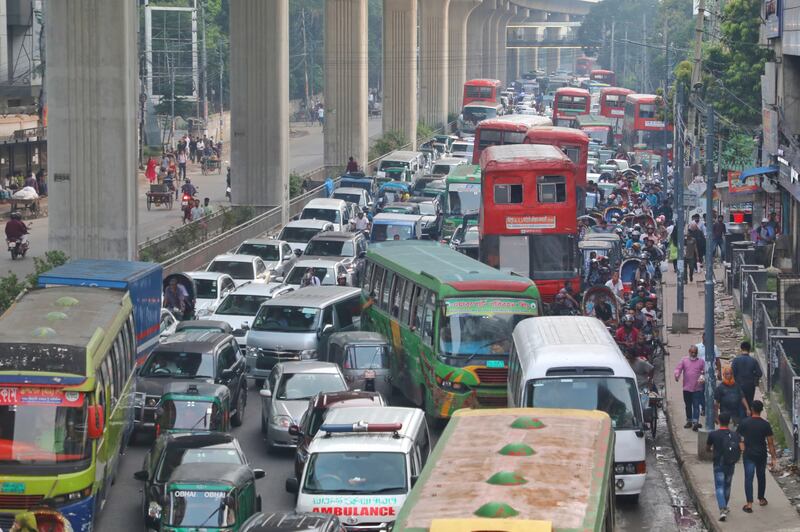Security forces fired on workers protesting outside a garment factory near Dhaka, killing one and injuring about 30 others, as protests involving thousands of people paralyzed the Bangladesh capital and nearby communities on Monday.
Dhaka police confirmed that Kawser Hossain Khan, 26, an operator at MangoTex Ltd. in the Ashulia industrial enclave near Dhaka, was killed when law enforcers opened fire during a clash with workers.
Throughout the nation, jobless people and activists staged protests and defied a ban on public assembly near government buildings imposed late last month by the interim administration led by Muhammad Yunus. It has struggled to maintain law and order since replacing the government of former Prime Minister Sheikh Hasina, who resigned and fled the country on Aug. 5.
Near Yunus’ official residence, police fired tear gas canisters and stun grenades to disperse protesters who had assembled in defiance of the Aug. 25 ban. Those protesters called for the age of entry for public service jobs to top out at 35, an increase of five years.
Hasina, who had ruled the country for 15 consecutive years, fell from power amid student-led protests that began in July over demands that quotas for civil service and government jobs be overhauled to give young people with university degrees greater access to such posts.
Monday’s protests took place three days after Yunus, a Nobel laureate, addressed the United Nations General Assembly in New York, where he spoke about the youth-led “monsoon revolution” that had swept Hasina from power.
"We are committed to promote and protect the fundamental rights – for people to speak in freedom, [and] to assemble without fear or inhibition," Yunus said during his speech at the U.N., his first on the world stage since he became Bangladesh's interim leader.
Yunus returned to Dhaka over the weekend.
RELATED STORIES
[ ‘Outsiders’ blamed for disruption as Bangladesh garment workers stage protestsOpens in new window ]
[ Bangladesh’s interim govt struggles to stem nation’s long-held grievancesOpens in new window ]
[ Death toll in anti-Hasina unrest in Bangladesh may be double official tallyOpens in new window ]
Police: ‘Forced to fire’
Hazrat Ali said his cousin had been fatally shot in the abdomen. Kawser’s uncle, Delwar Hossain, confirmed his death.
“We have come to know that Kawser was killed in the trouble in Ashulia. His body has been sent to his hometown. I am going there,” Hossain told BenarNews, referring to the town of Mehendiganj, Barisal.
Hossain was asked if the family would file a complaint against law enforcers.
“What is the sense of filing cases? Is there any benefit? He is gone,” Hossain said, adding Kawser’s father, an ordinary villager, has four surviving sons.
The Ashulia protests occurred a week after owners accepted an 18-point demand of the workers.
Md. Sibgut Ullah, deputy inspector general of the industrial police, said joint security forces were “forced to fire.”
“The mob damaged several vehicles of the Army, RAB [Rapid Action Battalion] and the police. Several officers were injured in the violence,” he told BenarNews. “We were attacked by the mob, then we had to fire to save our lives.”
Police officials said one officer was injured and required hospitalization.
Mushrefa Mishu, president of Garment Worker Unity Forum union, said the workers were protesting against a delay in opening the factory.
"The workers have not received wages since July due to the anti-government protests," Mishu told BenarNews. "The factory has been closed for three months – they wanted it to open and get their arrears – but [people] were shot.
“Is this justice? What do we get from the new government?” she said. “Killing a worker is not acceptable.”
Traffic blocked
Elsewhere, students in Dhaka’s Panthapath neighborhood blocked traffic for hours, beginning at noon.
Dhaka Metropolitan Police spokesman Muhammad Talebur Rahman said students seeking the hike to the job age had gathered near Yunus’ residence.
“The police had to use stun grenades, tear gas canisters and a charged baton to disperse them. Now, the situation has been normalized,” said Rahman, adding that protests in other Dhaka locations led to traffic congestion.

An employee at a private firm in Dhaka’s Motijheel central business district, questioned the location of the demonstration.
“I do not see any justification to protest in front of the chief adviser’s house. They could have demonstrated on Dhaka University campus to avoid public suffering,” Kamal Ahmed told BenarNews. “Can they cause another job quota-style movement? I think not.”
“Due to the protests the whole city comes to a standstill. Now, occupying streets and protests have become a trend,” he said.
On Monday, the ministry of public administration formed a two-member committee, headed by Abdul Muyeed Chowdhury, a former adviser to the caretaker government, to review the demand for increasing the age for entry into public service. Md. Mokhlesur Rahman, secretary of the ministry, is the other member – officials did not say if the committee was created in response to the protest.
Nizam Uddin Ahmed, a political analyst and retired professor at Chittagong University, said Yunus’ interim government has not been able to stabilize law and order since taking over on Aug. 8.
“There is no effective policing in Bangladesh. Law and order has not been restored. Unless the government can restore law and order and resolve labor unrest, people will not accept them,” he told BenarNews.
